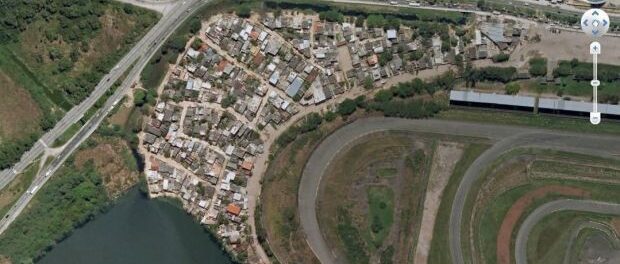
For the original article by Sheila Jacob in Portuguese published by Núcleo Piratininga de Comunicação click here.
As we have recently reported, the Vila Autódromo community, located in Barra da Tijuca, a prime area of Rio, has been mobilizing since last year to ensure its permanence despite the City’s plans to remove it in name of the 2016 Olympics. In a meeting with the Mayor on March 3rd, residents refused the proposal presented by City Hall and propose an alternative project that reconciles their staying with the Olympic Games.
The fact is that the project for the 2016 Olympics includes the removal of the families from Vila Autódromo, where the construction of the Media Center and Olympic Training Center are planned. Since the announcement of the removal, made by the Mayor of Rio, Eduardo Paes (PMDB/RJ), in press conferences, the residents have stated their desire to stay at assemblies held in the community, organized by the Residents’ Association – of which over a thousand people have participated.
To discuss the specific case of the Vila Autódromo, a meeting was held this Wednesday, March 3rd, at 5:00 PM, at City Hall headquarters. In addition to the Mayor himself and the Municipal Housing Secretary, Jorge Bittar (PT/RJ), leaders and residents of Vila Autódromo, public defenders of the state of Rio, and representatives from the Federation of the Residents’ Associations of the State of Rio (FAFERJ) and the National Movement for the Fight for Housing (MNLM) were present.
At the start of the meeting, the Mayor guaranteed that no measures would be taken without prior discussion with the residents of the community, and also said that he hopes that the Olympics come to signify social transformation and concrete improvements for the entire city, such as the urbanization of the favelas. In the case of Vila Autódromo, he proposed an indemnification or the resettlement of the families, that is, moving them to locations near to where their homes are currently.
The President of the Residents’ Association, Altair Guimarães, and other residents from the community present refused the Mayor’s proposal, echoing the voices of others who do not want to leave their homes or their life history. “I came here with the hope that the Games would take place where the community is today. I understand what you are offering, but know that this is not what the community wants,” said Altair to the Mayor. Jane Nascimento, also from the association, said she considers the proposal “disrespectful”, and defended the urbanization of the community, which would significantly improve the image of the city in international eyes.
Mayor admits that there was a mistake in the project design
As stressed the lawyer Alexandre Mendes, from the Nucleus of Lands and Housing from the Public Defender’s Office of the State of Rio, one major problem is the fact that the project was prepared without prior consultation with the community’s inhabitants. According to him, this finding allows a revision to be made by the International Olympic Committee (IOC). The Mayor himself apologized and admitted there was a “mistake at the origin,” and said he is open to other proposals.
In light of this, the Public Defender Maria Lúcia Pontes requested that the official project approved by the IOC be analyzed and discussed. The idea is to build, together with other partnered entities and movements, a counter-proposal, which “clearly will be prepared so that the community stays,” as the lawyer pointed out. This alternative project will be presented at the next meeting with the Mayor – with indications of it being held in the beginning of April. She said that the fight of the Public Defender’s Office and the residents is not to allow a repeat of what takes place in other countries when “the poor are excluded from the city,” so that large-scale events like this can take place.
